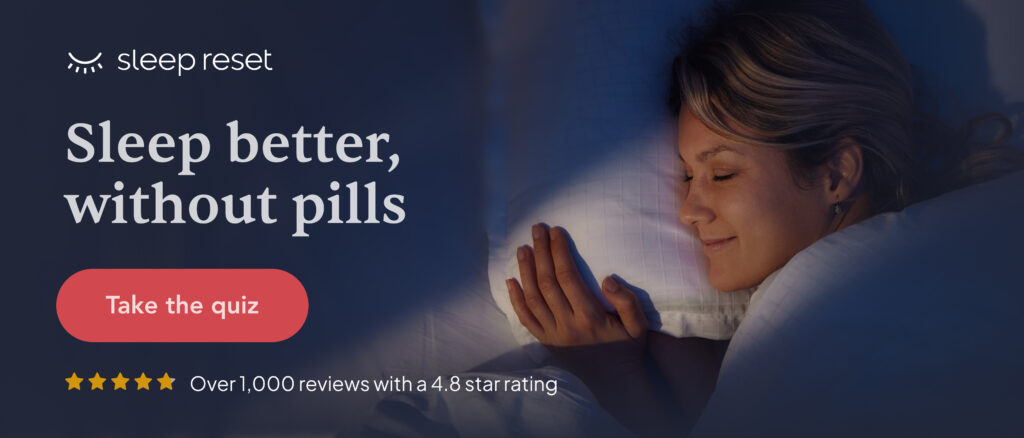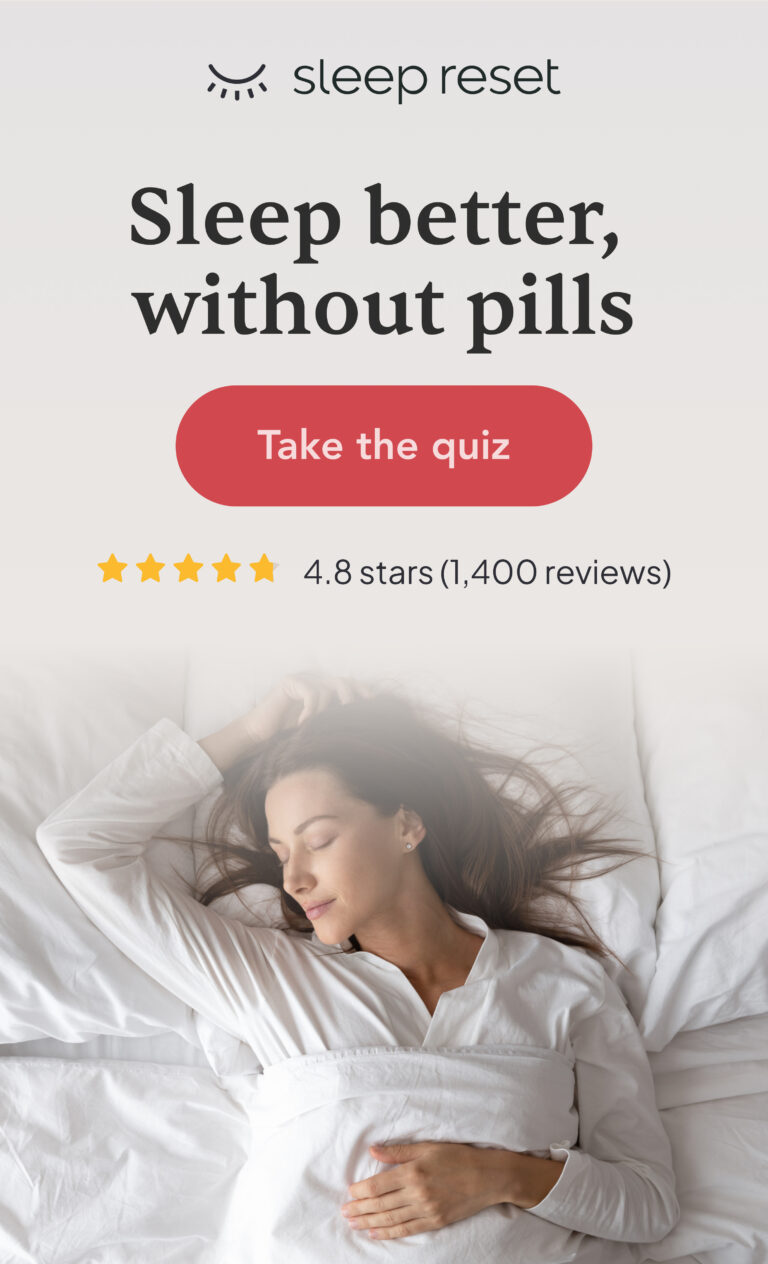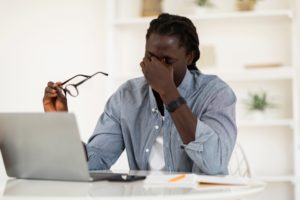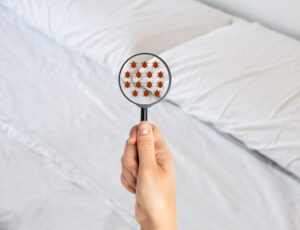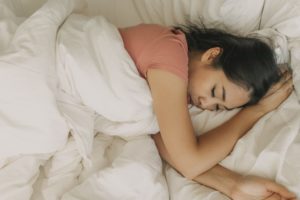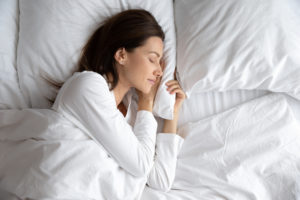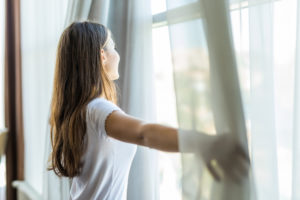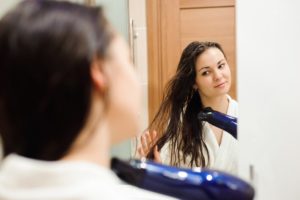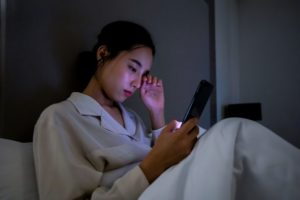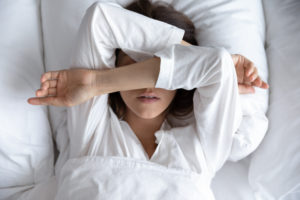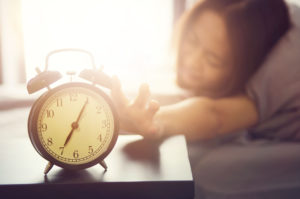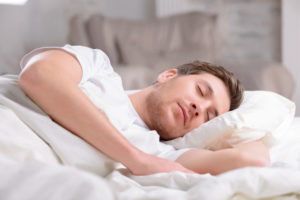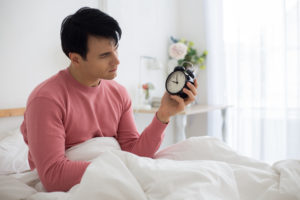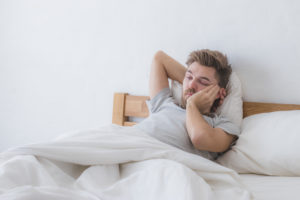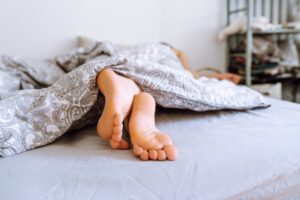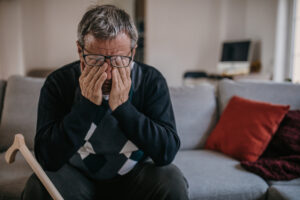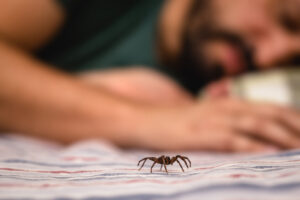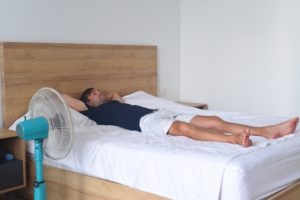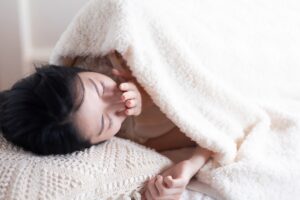Why Do I Wake Up at 3 am?
- Environmental factors, sleep disorders, and health conditions can contribute to waking at 3 a.m.
- Daytime disruptions to circadian rhythm or lifestyle may influence the risk of waking from sleep.
- A consistent sleep schedule and bedtime routine helps to promote sleep quality and duration.
- Consult with a healthcare professional to identify and address causes of frequent early wakings.
Waking up at 3 a.m. and finding it difficult to fall back asleep can be a frustrating experience. Some people may wonder what might be causing this kind of sleep disruption and whether they should seek out help.
Waking up in the middle of the night or early morning, called nocturnal awakening or early morning awakening, is common. One U.S. study found 35.5% of people wake up in the middle of the night on three or more nights per week. A similar study conducted in multiple European countries found nearly one-third of people wake up three or more nights per week.
While it is not always possible to pinpoint the exact reason a person wakes up at 3 a.m., understanding common causes of sleep disruptions may help people sleep more soundly through the night. Learn about the various reasons a person might find themselves waking up at 3 a.m., as well as tips for better sleep and when to consult a doctor.
Sleep Environment Disturbances
Nighttime noise , such as sounds from outdoor traffic, televisions, or cell phones, is a significant cause of disturbed sleep. Similarly, exposure to light from an outdoor light shining through a window or even a dim nightlight can also cause a person to wake up during the night.
Waking up may be more likely in the early morning hours due to how the body advances through the stages of sleep. As a person moves through periods of light, deep, and rapid eye movement sleep, more time is spent in light sleep as the night progresses. A person in light sleep is more easily awakened from environmental noise.
Is Your Troubled Sleep a Health Risk?
A variety of issues can cause problems sleeping. Answer three questions to understand if it’s a concern you should worry about.
Bathroom Breaks
Sometimes, when a person wakes up during the night they feel a need to urinate, which is referred to as nocturia. For many people, nocturia may be due to drinking too much liquid near bedtime, particularly coffee or alcohol. For others, nocturia may be the result of a bladder condition, urinary issues, or other health conditions like obstructive sleep apnea and diabetes. Nocturia is also common during pregnancy and usually goes away within a few months after giving birth.
Menopause
Hormonal changes during menopause can also cause disrupted sleep. Symptoms of menopause are caused by decreasing production of certain hormones and often include nighttime and early morning awakenings. Some awakenings may coincide with hot flashes , night sweats, or insomnia. For some, nighttime awakenings persist after menopause, due to continued hot flashes or an increased risk for obstructive sleep apnea.
Sleep Disorders
Sleep disorders are conditions that affect the quality, timing, and amount of sleep a person gets each night. Nocturnal awakenings are a symptom of several sleep disorders.
- Insomnia: People with insomnia may have issues with sleep maintenance, or the ability to stay asleep throughout the night. In particular, nighttime awakenings that last for 30 minutes or more is a hallmark symptom of insomnia.
- Obstructive sleep apnea (OSA): OSA causes lapses in breathing that may wake a person up during the night. As some people may not be aware of their OSA symptoms, they may feel they have woken up in order to urinate.
- Circadian rhythm disorders: For people with circadian rhythm disorders, there is a misalignment between their internal clock and the environmental cues that trigger the body to be awake or asleep. Certain circadian rhythm disorders, like advanced sleep phase disorder and irregular sleep-wake rhythm, cause a person to wake up at unusual times.
- Nightmare disorder: Nightmares are most likely to occur in the middle of the night or early morning and may wake a person up. Feelings of distress and worry from a nightmare may make it hard to fall back asleep, which can make obtaining quality sleep even more difficult.

Stress, Anxiety, or Depression
Some people are more likely to experience disrupted sleep during stressful times. This trait is called sleep reactivity , and it can cause a person to have trouble staying asleep throughout the night. Females and people with certain inherited genetic traits are more likely to experience sleep reactivity. Stress reactivity is also more common in people who tend to focus their thoughts on the things that cause stress.
Studies show that people with post-traumatic stress disorder (PTSD) are likely to experience disrupted sleep during the night. Nighttime awakenings may be more common in the early years of PTSD and become less frequent over time. Trouble staying asleep through the night is also common in people with other anxiety disorders, including panic disorder and phobias.
Trouble sleeping is a common symptom in people with major depression. Experts suspect that depression impacts sleep by altering a person’s circadian rhythm, or the internal body clock that regulates the sleep-wake schedule . When the internal body clock is disrupted, a person might find themselves feeling alert at times they would normally be asleep.
Health Issues and Medications
A variety of health issues are associated with waking up during the night.
- Pain: Physical pain can make it hard to have a restful night of sleep for a number of reasons. A recent study observed that those dealing with pain were four times more likely to have trouble falling back to sleep after a nighttime awakening.
- Heart and vascular conditions: High blood pressure, heart disease, and stroke are associated with poor quality sleep, including waking up during sleep.
- Airway diseases: In addition to obstructive sleep apnea, other breathing disorders like asthma and chronic obstructive pulmonary disease (COPD) can disrupt sleep through the night.
- Endocrine disorders: Diabetes, vitamin D deficiency, and hyperthyroidism are among a number of hormone disorders that are associated with poor quality sleep.
- Neurological disorders: Although it is normal to undergo a number of changes to sleep patterns as people age, those with conditions like dementia , Alzheimer’s disease, and Parkinson’s disease are more likely to experience nighttime awakenings and have trouble returning to sleep .
Additionally, some medications used to treat health issues, like corticosteroids and diuretics, can also cause nighttime awakenings.
Aging
A person’s circadian rhythm changes with age, making early-morning awakenings more common in older adults. In fact, it is common for older adults to wake up three to four times every night .
Older adults spend less of their sleep time in deep sleep, which may contribute to waking up more easily during the night. Other causes of age-related sleep changes include nocturia, anxiety, and symptoms of chronic health issues.
Tips for Sleeping Through the Night
People whose sleep is disrupted by waking up at 3 a.m. can try following healthy sleep tips to sleep through the night more consistently.
- Avoid caffeine and alcohol: Both caffeine and alcohol are associated with disrupted sleep, especially when they are consumed later in the day. These substances may leave a person having trouble falling asleep and more likely to need to wake up to urinate.
- Increase daytime light exposure: Exposure to sunlight or a bright lamp may help some people sleep better at night and feel more alert during the day. Studies have found bright light therapy to benefit people with general sleep problems, circadian rhythm disorders, insomnia, and sleep issues related to Alzheimer’s and dementia.
- Try exercise or yoga: Engaging in regular exercise, preferably earlier in the day, may improve sleep. One study found that daytime yoga in particular is associated with less time awake in bed during the night and improves the ability to fall back asleep more quickly after a nocturnal awakening.
- Avoid evening meals: A recent survey suggests that late meal timing can increase a person’s likelihood of awakening during the night. Although more research is needed, people experiencing nocturnal awakenings may want to avoid eating in the three hours before sleep.
- Keep the bedroom dark and quiet: Environmental disturbances, like noise and light, can wake a person from nighttime sleep. If darkness and quiet are not possible, wearing a sleep mask to block out light and earplugs to block out sound can help.
When to Talk to Your Doctor
Although nighttime awakenings are common and generally easy to remedy, they may also be a sign of a larger issue. If you feel that sleep disruptions are affecting your quality of life or if you are experiencing symptoms of other health problems, you may find it helpful to consult with a doctor to rule out an underlying disorder. Older adults who are experiencing nighttime awakenings are encouraged to talk to their doctor about how to reduce the risk of falls or accidents that could occur when getting out of bed at night.

Still have questions? Ask our community!
Join our Sleep Care Community — a trusted hub of sleep health professionals, product specialists, and people just like you. Whether you need expert sleep advice for your insomnia or you’re searching for the perfect mattress, we’ve got you covered. Get personalized guidance from the experts who know sleep best.
References
12 Sources
-
Halperin, D. (2014). Environmental noise and sleep disturbances: A threat to health? Sleep Science, 7(4), 209–212
https://pubmed.ncbi.nlm.nih.gov/26483931/ -
Cho, C. H., Yoo, H. K., Kang, S. G., Kim, L., Lee, E. I., & Lee, H. J. (2018). Impact of exposure to dim light at night on sleep in female and comparison with male subjects. Psychiatry Investigation, 15(5), 520–530.
https://pubmed.ncbi.nlm.nih.gov/29551048/ -
Jehan, S., Masters-Isarilov, A., Salifu, I., Zizi, F., Jean-Louis, G., Pandi-Perumal, S. R., Gupta, R., Brzezinski, A., & McFarlane, S. I. (2015). Sleep disorders in postmenopausal women. Journal of Sleep Disorders & Therapy, 4(5), 212.
https://pubmed.ncbi.nlm.nih.gov/26512337/ -
Thurston, R. C., Chang, Y., Buysse, D. J., Hall, M. H., & Matthews, K. A. (2019). Hot flashes and awakenings among midlife women. Sleep, 42(9), Article zsz131.
https://pubmed.ncbi.nlm.nih.gov/31152182/ -
Kalmbach, D. A., Anderson, J. R., & Drake, C. L. (2018). The impact of stress on sleep: Pathogenic sleep reactivity as a vulnerability to insomnia and circadian disorders. Journal of Sleep Research, 27(6), Article e12710.
https://pubmed.ncbi.nlm.nih.gov/29797753/ -
Khawaja, I. S., M Hashmi, A., Westermeyer, J., Thuras, P., & Hurwitz, T. (2013). Nocturnal awakening & sleep duration in veterans with PTSD: An actigraphic study. Pakistan Journal of Medical Sciences, 29(4), 991–996.
https://pubmed.ncbi.nlm.nih.gov/24353674/ -
Varinthra, P., & Liu, I. Y. (2019). Molecular basis for the association between depression and circadian rhythm. Ci ji yi xue za zhi = Tzu-chi medical journal, 31(2), 67–72.
https://pubmed.ncbi.nlm.nih.gov/31007484/ -
Neikrug A. B., & Ancoli-Israel S. (2021, November 12). Sleep-wake disturbances and sleep disorders in patients with dementia. In C.A. Goldstein, R. Benca, & K. Yaffe (Eds.). UpToDate., Retrieved April 8, 2022, from
https://www.uptodate.com/contents/sleep-wake-disturbances-and-sleep-disorders-in-patients-with-dementia -
A.D.A.M. Medical Encyclopedia. (2020, July 19). Aging changes in sleep. MedlinePlus., Retrieved April 8, 2022, from
https://medlineplus.gov/ency/article/004018.htm -
van Maanen, A., Meijer, A. M., van der Heijden, K. B., & Oort, F. J. (2016). The effects of light therapy on sleep problems: A systematic review and meta-analysis. Sleep Medicine Reviews, 29, 52–62.
https://pubmed.ncbi.nlm.nih.gov/26606319/ -
Kudesia, R. S., & Bianchi, M. T. (2012). Decreased nocturnal awakenings in young adults performing bikram yoga: A low-constraint home sleep monitoring study. ISRN Neurology, 2012, Article 153745.
https://pubmed.ncbi.nlm.nih.gov/22577578/ -
Chung, N., Bin, Y. S., Cistulli, P. A., & Chow, C. M. (2020). Does the Proximity of Meals to Bedtime Influence the Sleep of Young Adults? A Cross-Sectional Survey of University Students. International journal of environmental research and public health, 17(8), 2677.
https://pubmed.ncbi.nlm.nih.gov/32295235/


